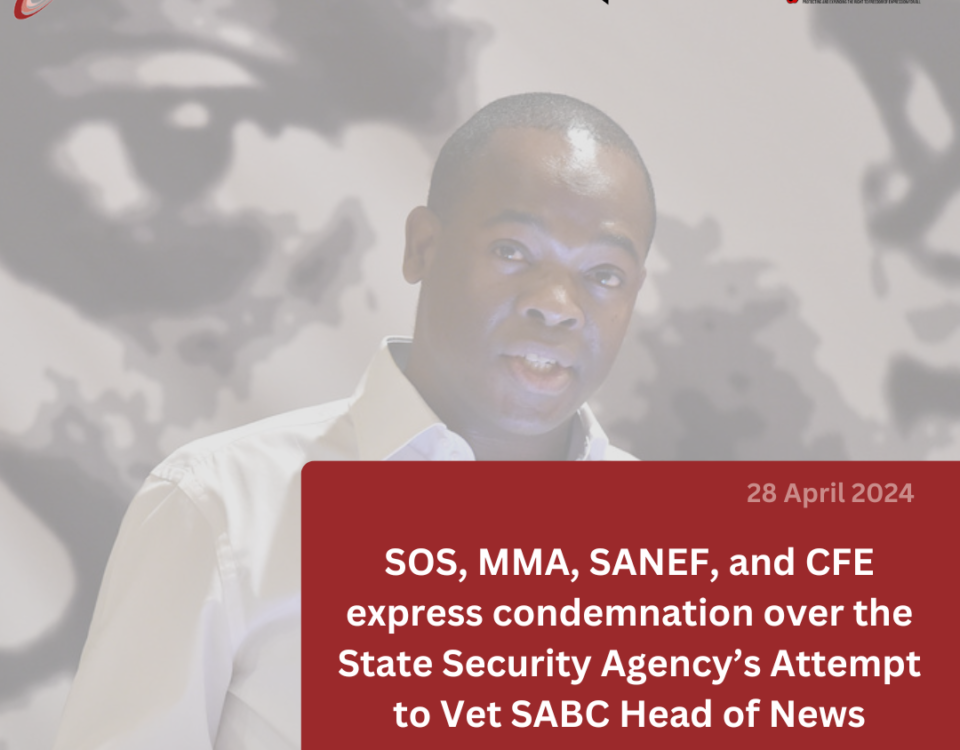SOS & MMA Statement SABC and eMedia Distribution Deal
March 29, 2021Press Statement: ICASA’s Announcement on Local Content Regulations
May 29, 2021SA Youth Reflect On Press Freedom

Today marks over 30 years since the annual celebration of World Press Freedom Day. To mark the 2021 celebrations, we asked a number of young people in South Africa to share with us what press freedom means to them. In response, Mpho Ndaba, who is media freedom activist and writer based in Johannesburg, reflects on his experiences as a Black queer person and how media has been foundational to his sense of freedom:
“As a Black bisexual man living in a society where people like me exist in the margins, and coming from a remote part of South Africa where for a very long time we did not have a television set, press freedom matters. In fact, it was by the time when we got television at home that I began to draw from the works of brave film and television producers, whose work attempted to account for my lived experiences – here shows like After 9, Generations, and Society left an incredible mark in my life. And of course, I myself have since gone on to try and expand that archive through the writing as a medium. Press freedom, I would say, is tied to my everyday effort to survive a society that is deeply anti-poor, anti-queer, and organized around the interests of capital”
Fezokuhle Mthonti, a freelance art journalist, having largely written for the New Frame, argues that the history of South Africa as it relates to Black subjugation, makes press freedom even more important:
“Given South Africa’s history with slavery, colonization, and apartheid, Black people particularly, haven’t had the opportunity to document the horrors of the brutalities and oppression that they have faced. Press freedom is incredibly important for those of us who finally have the chance to make sense of that. But as an art journalist specifically, we know that artists have been writing, thinking, and memorializing us consistently, through their music, their theatre productions, their artwork, and various other mediums. In that sense, art has always been a discussive resistance against oppressive narratives. So, I think it is even more important as an art journalist to take modalities of thought in the struggle and begin historizing. And connect it with the global struggles of resistance.”
This is what Thulani Dlamini, a writer based in Cape Town, had to say:
“Press freedom, to me, is the ability of the press in a country to do their work without external pressure or threat of censorship. It’s the guarantee that members of the media will be allowed to bring light to what happens in the dark without fear of retaliation through legal or illegal means. The freedom relates to actually doing their work, and to the content that they put out. However, it has a corollary responsibility.”
Dlamini further argues that the press ought to carefully consider not being used in political agendas:
“The press is duty bound to do their work in a manner that is responsible, truthful, and fair. In the South Africa context, press freedom, is to be viewed in light of the Constitution and its objectives. The press is a necessary element in the various accountability measures in place. The press often brings to the fore the abuses of state power and this is what allows mechanisms to be put to work in resolving issues. However, the press must always be wary of being used to further particular political agendas.”
For Nomshado Lubisi, who works as the communications manager at Media Monitoring Africa, also integral to media freedom is the ability to demand accountability from the media itself:
“Given the historic horror of apartheid, media censorship, and the absence of democracy in that era, press freedom highlights the importance of transparency and the human right to access information. And although the press has this freedom, they have to ensure that they are reporting ethically and fairly. And that there is no political interference. It is also inspiring to witness how young people are taking up space in different media sectors, expressing societal issues, and celebrations in different forms. It is exciting that we are in an era full of writers and people who are writing. As a young person it is motivating and inspiring that we can hold media to account, and that we can access information in different forms.”
For Azola Dayile, who works as program manager (advocacy, litigation, and lobbying) at Media Monitoring Africa, the sanctity of journalism as a practice, is what must be protected:
“The day in and of itself is significant in the sense that we remember and recognize the importance of truthful, independent, and fair media and journalism. Especially during a time where its credibility is at its all-time low in post-apartheid South Africa, because of issues to do with racism, biasness, the lack of transformation in terms of ownership. The loss of revenue itself has also had an impact on the quality of journalism we have been seeing, as well as the moving away from core media ethics. This day reminds us of the work we ought to do as media practitioners and activists. It reminds us to fight for the sanctity of the craft of journalism as a practice. This is what Press Freedom Day means to me.”

